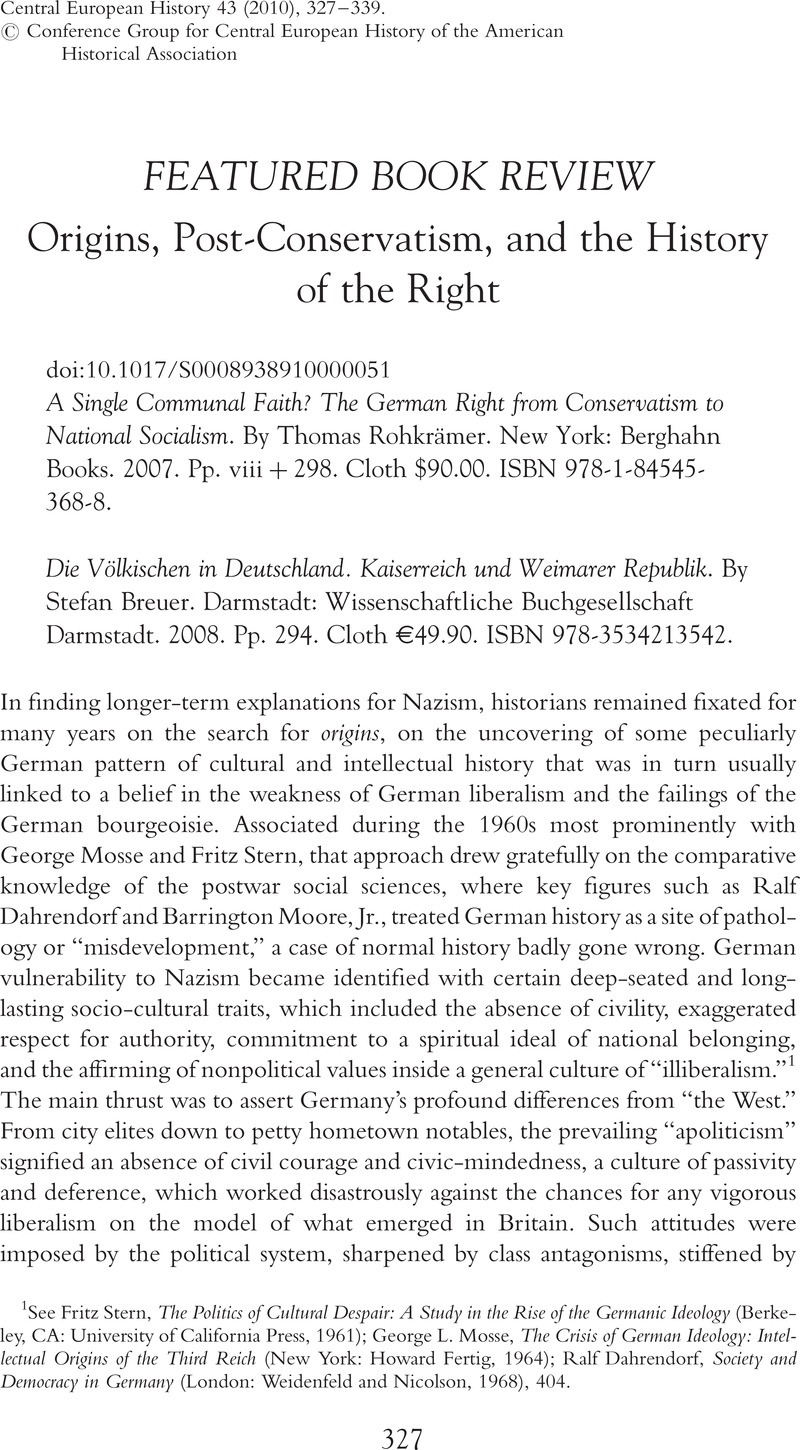Published online by Cambridge University Press: 13 May 2010

1 See Stern, Fritz, The Politics of Cultural Despair: A Study in the Rise of the Germanic Ideology (Berkeley, CA: University of California Press, 1961)Google Scholar; Mosse, George L., The Crisis of German Ideology: Intellectual Origins of the Third Reich (New York: Howard Fertig, 1964)Google Scholar; Dahrendorf, Ralf, Society and Democracy in Germany (London: Weidenfeld and Nicolson, 1968), 404Google Scholar.
2 See Lepsius, M. Rainer, “Parteiensystem und Sozialstruktur. Zum Problem der Demokratisierung der deutschen Gesellschaft,” in Die deutschen Parteien vor 1918, ed. Ritter, Gerhard A. (Cologne: Kiepenheuer und Witsch, 1973), 56–80Google Scholar; and Lepsius, M. Rainer, “Demokratie in Deutschland als historisch-soziologisches Problem,” in Spätkapitalismus oder Industriegesellschaft. Im Auftrage der Deutschen Gesellschaft für Soziologie, ed. Adorno, Theodor W. (Stuttgart: F. Enke, 1969), 197–213Google Scholar. Both essays were republished in Lepsius, M. Rainer, Demokratie in Deutschland. Soziologisch-historische Konstellationsanalysen. Ausgewählte Aufsätze (Göttingen: Vandenhoeck & Ruprecht, 1993), 25–50, 11–24CrossRefGoogle Scholar; Wehler, Hans-Ulrich, Das Deutsche Kaiserreich 1871–1918 (Göttingen: Vandenhoeck & Ruprecht, 1973)Google Scholar, translated as The German Empire 1871–1918 (Leamington Spa: Berg, 1985).
3 Stern, Fritz, “Introduction,” in Stern, The Failure of Illiberalism: Essays on the Political Culture of Modern Germany (London: George Allen and Unwin, 1972), xGoogle Scholar.
4 Mosse, Crisis of German Ideology, 1.
5 Williamson, George S., The Longing for Myth in Germany: Religion and Aesthetic Culture from Romanticism to Nietzsche (Chicago: University of Chicago Press, 2004)Google Scholar; Boyer, Dominic, Spirit and System: Media, Intellectuals, and the Dialectic in Modern German Culture (Chicago: University of Chicago Press, 2005)Google Scholar; Cramer, Kevin, The Thirty Years' War and German Memory in the Nineteenth Century (Lincoln, NE: University of Nebraska Press, 2007)CrossRefGoogle Scholar; Hull, Isabel V., Absolute Destruction: Military Culture and the Practices of War in Imperial Germany (Ithaca, NY: Cornell University Press, 2005)Google Scholar; Smith, Helmut Walser, The Continuities of German History: Nation, Religion, and Race Across the Long Nineteenth Century (Cambridge: Cambridge University Press, 2008)CrossRefGoogle Scholar. The same interpretive tradition certainly retains its life in Germany itself and elsewhere, too, but the discussion in the English-speaking world contains its own distinctive inflections. For a recent German text bizarrely indifferent to the critique of the Sonderweg thesis, see Lepenies, Wolf, The Seduction of Culture in German History (Princeton, NJ: Princeton University Press, 2006)CrossRefGoogle Scholar.
6 See Breuer, Stefan, Ordnungen der Ungleichheit. Die deutsche Rechte im Widerstreit ihrer Ideen 1871–1945 (Darmstadt: Wissenschaftliche Buchgesellschaft, 2001)Google Scholar; Breuer, Stefan, Grundpositionen der deutschen Rechten 1871–1945 (Tübingen: Edition Diskord, 1999)Google Scholar; Breuer, Stefan, Anatomie der konservativen Revolution (Darmstadt: Wissenschaftliche Buchgesellschaft, 1993)Google Scholar; Breuer, Stefan, Nationalismus und Faschismus. Frankreich, Italien und Deutschland im Vergleich (Darmstadt: Wissenschaftliche Buchgesellschaft, 2005)Google Scholar.
7 Puschner, Uwe, Die völkische Bewegung im wilhelminischen Kaiserreich. Sprache, Rasse, Religion (Darmstadt: Wissenschaftliche Buchgesellschaft, 2001)Google Scholar; Puschner, Uwe, Schmiotz, Walter, and Ulbricht, Justus H., eds., Handbuch zur “Völkischen Bewegung” 1871–1918 (Munich: K. G. Saur, 1996)CrossRefGoogle Scholar.
8 As well as Breuer, Ordnungen, see Breuer, Die Völkischen, 12–22; Breuer, Anatomie, 9–25; and Breuer, Stefan, “Der Neue Nationalismus in Weimar und seine Wurzel,” in Mythos und Nation. Studien zur Entwicklung des kollektiven Bewußtseins in der Neuzeit, ed. Berding, Helmut (Frankfurt am Main: Suhrkamp, 1996), 257–74Google Scholar.
9 Here Breuer observes his crucial distinction between conservative and post-conservative forms of thought, where the latter are taken to characterize the “Right” per se. In other words, the active embrace of technological modernity and mass-political action was precisely what distinguished the early twentieth-century Right from those preceding traditionalist forms of conservatism.
10 Breuer, Die Völkischen, 14. This argument has affinities with an earlier literature linking the emergence of a new anti-Semitic and radical-right politics to changes occurring in those same parts of the social structure and small business sectors of the economy. See Gellately, Robert, The Politics of Economic Despair: Shopkeepers and German Politics 1890–1914 (London: Sage, 1974)Google Scholar; Volkov, Shulamit, The Rise of Popular Antisemitism: The Urban Master Artisans, 1873–1896 (Princeton, NJ: Princeton University Press, 1978)Google Scholar; Winkler, Heinrich August, Mittelstand, Demokratie und Nationalsozialismus. Die politische Entwicklung von Handwerk und Kleinhandel in der Weimarer Republik (Cologne: Kiepenheuer and Witsch, 1972)Google Scholar.
11 Breuer, Die Völkischen, 14.
12 For an interesting and courageous attempt to explore this new cultural predicament, see Radkau, Joachim, Das Zeitalter der Nervosität. Deutschland zwischen Bismarck und Hitler (Munich: Hanser, 1998)Google Scholar; also Rabinbach, Anson D., The Human Motor: Energy, Fatigue, and the Origins of Modernity (New York: Basic Books, 1990)Google Scholar.
13 Breuer's approach is an adaptation of Ulrich Beck's concept of “reflexive modernization,” which finds certain entailments of critique and dissatisfaction always already inscribed in the very processes of industrial society's unfolding. With subsequent twentieth-century restructurings of economy and society, such unease is then increasingly, explicitly, and elaborately realized across the many different fronts of social, cultural, and intellectual life. For Beck this signifies the transition from a “first” to a “second modernity.” Where the former may be characterized by the assertion of powerful ordering principles increasingly implemented through the agency of a state, accompanied by the dream of society's eventual cohesion and ultimately realized integration, the latter is predicated around growing uncertainty and skepticism about such things, involving instability, complexity, ambivalence, and necessary incompletion. Thus a key manifestation of the advent of “reflexive modernity” at the turn of the twentieth century, according to Breuer, was the holistic desire for “re-integration,” a “synthetic-harmonizing pattern of thought,” through which its exponents hoped a lost wholeness might be regained. See Breuer, Die Völkischen, 13, 14–20; Beck, Ulrich, The Risk Society: Towards a New Modernity (London: Sage, 1992)Google Scholar.
14 For a similar determinism, see Muller, Jerry Z., The Other God That Failed: Hans Freyer and the Deradicalization of German Conservatism (Princeton, NJ: Princeton University Press, 1987), 38Google Scholar.
15 Lohalm, Uwe, Völkischer Radikalismus. Die Geschichte des Deutschvölkischen Schutz- und Trutz-Bundes 1919–1923 (Hamburg: Leibniz-Verlag, 1970)Google Scholar.